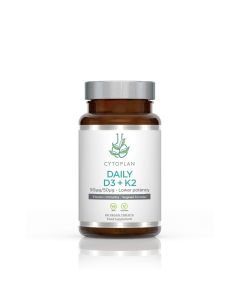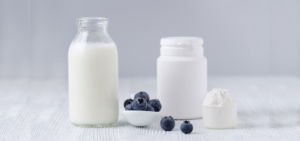There is now a wealth of information on the gut microbiome which continues to demonstrate that the health of the gut is often at the core of our overall health, and an imbalance in our microbiome can manifest in many different health conditions. Good gut health occurs when there is a balance between the friendly bacteria and harmful bacteria in the gut although this balance can be easily disrupted by stress, poor diet, excess alcohol, illness and antibiotic use. Including a multi-strain probiotic supplement can help to restore a favourable balance.
The friendly bacteria in the gut carry out many functional roles including supporting the immune system, helping us to digest food, producing vitamins and keeping pathogenic bacteria at bay. Many traditional societies include bio-cultured food products as an important part of their daily diets, such as yoghurt, miso, kefir and fermented fruits and vegetables. These are all foods known to contain cultures of friendly bacteria and the health-promoting benefits of these foods have been noted for many years.
Here at Cytoplan we have developed a range of safe and effective probiotic supplements which have been uniquely formulated to suit all the family - from probiotics for babies and children, to both younger and older adults too. We also offer a uniquely formulated probiotic for women. Our range of probiotic supplements can be used to maintain health, or for more acute situations where additional support is needed. Individual strains of probiotics have specific modes of action, and each strain has been clinically researched for its efficacy and included for its unique benefit. The combination of complementary strains included in our probiotic supplements provide a beneficial sphere of activity and have been expertly formulated.
Bacteria used as probiotic strains must have several desirable qualities:
- Production of lactic acid and other acids which lower the pH of the digestive tract and reduce pathogenic bacteria
- Compatibility with the natural lactic acid bacteria of the digestive tract
- Significant resistance to acidity, especially of the stomach, which allows more bacteria to reach their site of action
- Resistance to bile
- Adherence to buccal, intestinal, vaginal mucosa and epithelial cells to prevent pathogens from adhering to these sites
- Production of inhibitors of undesirable pathogenic bacteria
- Stimulation of immunity. Different strains of probiotic bacteria stimulate different aspects of the immune system - no single bacteria can do it all
- Stability through shelf life
- Resistance to antibiotics, so that a mixture of species of probiotic bacteria could resist most antibiotics in use and continue to protect the digestive system
Cytoplan uses only the highest quality friendly bacteria strains that are pure, naturally fermented, antibiotic resistant and are able to survive the challenges of stomach acid and bile within the digestive tract. Our probiotic supplements do not require refrigeration, are stable at room temperature and have a guaranteed count through their shelf life.
To further enhance the quality of our probiotic supplements, we have introduced GUARD technology into a selection of products including Acidophilus Plus, Fos-a-dophilus and Women's Biotic. GUARD technology is a patented, innovative and natural technology which protects the bacterial strains from stomach acid and enables the timed release of probiotics within the intestines. GUARD technology includes the introduction of a new ingredient referred to as NutraJIT®; a patented, innovative and natural oral delivery platform. When the probiotic supplement is administered orally and reaches the stomach, a gel barrier forms to protect the active ingredient from the stomach’s acidity. Once in the intestines, the gel dissipates to ensure a controlled release of the active ingredients and maximise the product’s efficacy at the ideal site of action.
Our range of probiotic supplements are suitable for vegetarians, and we have vegan probiotic supplements available too. Our probiotics come in capsule or powder form to suit individual preference or to allow for flexible dosing or ease of intake.
What are the benefits of probiotics?
Probiotics can help to support a diverse and favourable balance of friendly bacteria in the gastrointestinal tract, which has numerous benefits for our health. Some of the roles beneficial gut bacteria play include:
- helping us to digest food
- absorbing nutrients
- keeping pathogenic bacteria at bay
- supporting the immune system
- producing certain vitamins
The list of health benefits mediated by probiotics extends to many further areas of health.
Can I take probiotics with antibiotics?
Who should take a probiotic supplement?
The balance of bacteria within the gut can be easily disrupted by stress, poor diet, medications, illness and infection, and so probiotic supplements can be beneficial in these instances. They may also be helpful for those who are looking to optimise their health in general. In addition, probiotic supplements may be beneficial for:
- people taking, or who have taken antibiotics
- those who are, or have recently travelled abroad
- those who suffer from dysbiosis, digestive insufficiency or digestive upsets
- those who suffer from hay fever or allergies
- those who suffer frequent coughs/colds or infections
What is the difference between probiotics and prebiotics?
Probiotics are live friendly bacteria or specific yeast species that naturally live in the body. Prebiotics are dietary substances which are indigestible by humans, such as fructo-oligosaccharides (FOS) that provide the fuel for probiotics and stimulate the growth of healthy bacteria in the gut at the expense of pathogenic bacteria. The addition of FOS and inulin to our probiotic formulas is only sufficient to act as food for the bacterial strains in the products and will not have a FOS-effect in the body. Prebiotics are present in fibre-rich foods and probiotics occur in fermented foods such as yoghurt, kefir, miso, sauerkraut and tempeh.












